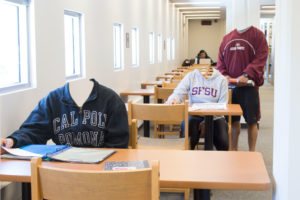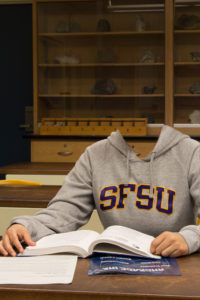University to Community College: Talking to Students about their Transition to the ’13th grade’ after Attending a University
Growing up with the renowned Claremont Colleges in your backyard, makes it unfathomable to consider going to a community college after high school.
I grew up thinking a four-year university was my only option. My family has usually supported my choices, but attending a community college after high school was not considered ‘in the cards.’
My parents hoped I would be more successful than they were. They wanted me to thrive. My mother did not want me to make the same mistake she did by dropping out of school. Although she eventually earned her degree, she frequently told me that if I went to a community college, I would get stuck or it would be harder for me to transfer.
Society tends to view community college as a ‘13th grade’–a place for students without a future. This stigma that community college is not ‘real college’ is completely false. Rather, community college is a wonderful alternative because it can serve any student in any situation.

As a high school senior, you have the pressures of college applications, letters of recommendation, placement exams, learning about FAFSA and deciding where you want to spend the next four years. Getting caught up in the excitement of leaving home and independence is all an 18 year old could ask for, but I was unprepared to board the roller coaster of change that awaits college freshmen.
I attended San Francisco State University in the fall of 2014. I majored in communications and I was ecstatic for what I thought the Bay Area had in store.
That dream was short lived as I moved back home spring semester of my first year. Unexpected housing problems and exorbitant Bay rental prices took a major toll on my family and me. For the rest of that semester, I did not attend school. I needed to figure out my next move.
Even though I had thought of attending Citrus College in the fall of 2015, I still decided against it. I did not have the courage to tell my parents what I wanted. The thought of being considered a failure by my family was overwhelming. Instead, I attended Woodbury University in the fall of 2015 in Burbank, CA.
I was doing a two hour commute every Monday and Wednesday for a full day of classes. The realization of the enormous debt I accrued was the last push for me to decide to attend Citrus College.
I started my first semester at Citrus College in the spring of 2016, but in the eyes of society I should have been halfway done with my second year of college.
Now attending Citrus College, I realize that stereotypes about community colleges are completely wrong. All the classes I needed to take were at Citrus and I was still getting a great education. I just needed an alternative to attending, yet another university.
According to the California Community Colleges Chancellor’s office, CCC are the largest provider of workforce training in both the state and nation. As of January 2016, 24% of community college students nationwide attend a California Community College.

I soon became aware that I was not the only student who had come from a university. This happens quite frequently, but is not widely discussed due to the stigma that society has spread about community colleges.
Kari Quiñonez is in her third year of her college journey. She grew up in Pomona, CA and graduated from Claremont High School. She is the first of her family to attend college. After a year and half at Cal State LA, she transferred to Azusa Pacific University. Quiñonez attended APU for a year before deciding to transfer to Citrus College in the spring of 2017.
Ethan Muro is also a student that made the decision to leave a four year and for a community college. He grew up in Monrovia, CA and graduated from Bonita High School in La Verne. Coming from a family where education is highly regarded, community college was never an option. He attended San Francisco State University in the fall of 2014, but left
after the first semester. He started at Citrus College in the spring of 2015.
I interviewed Kari Quiñonez and Ethan Muro to better understand how students transition from universities to community college.
What is your major? Where were you going to school before Citrus?
KQ: I started off as a nursing major, however when I was attending Cal State L.A. my counselor at the time advised me to change my major because I was barely passing my chemistry class. However, I always knew I wanted to go into the medical field, so I am now going to school to become a Physician Assistant. I am now majoring in Biology. I spent a year and a half at Cal State LA. One year was spent living on campus in a dorm and my last semester I was commuting. I then spent a year commuting to Azusa Pacific University .
What made you decide to go to APU over Citrus?
KQ: Well, at the time I was researching for a good Physician Assistant program closer to home. However, I was only looking at universities. I never had the thought of looking into community college because it was not in my plans nor did my mom agree with the idea of me attending a community college. After all the researching I did, I found that APU had the best program for the prerequisites I needed.
How does your experience at Cal State LA differ from APU?
KQ: Well the class size is a major difference. At Cal State LA, there is big lecture halls and you don’t get to know your professors or your peers in the class you are taking. When I was at APU, the classes were super small. There were about 15-30 people in my class and the professors really make an effort to get to know you as a student. I felt like I could truly get to know my professors and actually have them remember my name whereas at a public you have a room of 100 students with one professor lecturing. You are not able to get to know them on a personal level.
Were you always more encouraged to attend a university over a community college?
KQ: Yes. I am the first in my family to go to any type of college, but one thing that my mom always told me was that she did not want me attending a community college. She always thought I would be stuck there and never graduate.
What made you decide to finally attend Citrus?
KQ: Well, after my second semester, I suddenly became very aware of the fact of the debt I would be in once I finished at APU. I was conflicted because I kept thinking to myself, “A lot people do this, why can’t I do this?” I realized the amount of debt I would be in would take a major toll on me in the future and that scared me. So, I began to search for other options and that is when I looked into what Citrus had to offer. I can take all the prerequisites I need to take without taking the added religion course that was mandatory at APU, without the major commute to Cal State LA, and without spending an enormous amount of money. To be honest, I wish I just went to Citrus first. It would have saved me a lot of money and time.
Now that you are at Citrus, how has your view changed? How have you changed?
KQ: Well, I feel way more on track than I ever did at Cal State LA or APU. I feel like now I actually have a plan on how I am going to finish and where I am going. Knowing that I am only going forward now is such a relief. I realized that everyone is on their own path and time. Like, not everyone is going to finish in four years. You just have to do what fits you and get it done. I have accepted that I am not going to finish in four years and that is completely okay.
Why did you decide to attend San Francisco State University?
Ethan Muro: I went there because, well I am not sure why I went there exactly. I did not really want to attend college. I didn’t really like  school, but my mom is a teacher so it was basically a school or die type of thing. I was kind of forced to go to college in a way, which I was fine with because I wasn’t super against it. I just was not passionate or dedicated about going.
school, but my mom is a teacher so it was basically a school or die type of thing. I was kind of forced to go to college in a way, which I was fine with because I wasn’t super against it. I just was not passionate or dedicated about going.
What was it like to go to SFSU?
EM: It was cool. The people were cool, the city was fun. The school part of it was well… I just wasn’t into it. I wasn’t putting enough time to be super successful.
What made you decide to go to Citrus?
EM: [After my first semester]I started to learn about student loans, I didn’t really pay attention to that type of stuff before. To tell you the truth, my parents took care of the money stuff for me, as far as setting up loans and figuring out how much everything would cost. They were helping me out, but most of my expenses were through student loans. I realized that the loans add up pretty quick. Once I started to learn about what I was doing financially it made me really nervous and I did not want to go down that route of drowning in debt. Debt stays with you for a really long time and I knew I would for sure need to be out in those four years otherwise none of that would be worth it. Especially because I wanted to have a job and I wouldn’t be able to work if I had stayed up there.
What did your parents think of you going to Citrus?
EM: I am an only child, so they are not really pushy with a lot of things. They give me a lot of freedom, but they also knew I was still super young. So when I told them about this, my mom knows what it is like to be in debt. She went to Cal State Long Beach got her bachelor’s and then she went to Cal State Fullerton to get her Master’s. So once I told her my plans to go to Citrus, they were okay with is. They just wanted me to have a plan, no matter where I attended college or how I got there. As long as I was getting my education done somehow, they were going to support me.
What is your opinion of why so many people frown upon CCC?
EM: I mean I understand it, because I have seen a lot of students who are unmotivated at a community college. You can tell they are kind of forced to go here, rather them wanting to go here. So I get why it is frowned upon. Citrus has a lot of students that are trying to get things done and are motivated.
Do you feel like you have changed as a person that you have come to Citrus?
EM: I think I have grown the same amount that I think I probably would have grown at SFSU. However, there is a pretty big difference on responsibilities from then and now. I think if I would have stayed at state, I would have been independent, but it is more of a false independence.The only thing that would have made me independent was that I did not live with my parents, but my parents still would have been paying for me to live on my own. I would have still been living off of my parent’s paycheck. The only difference now is that I live with my parents, but I am still working and still getting my school done. I can actually pay for things on my own now.



